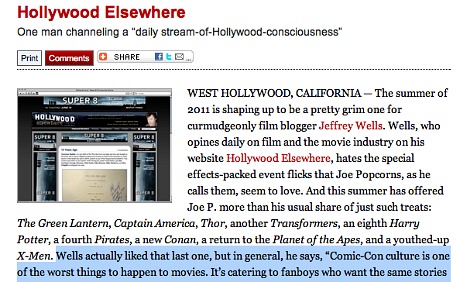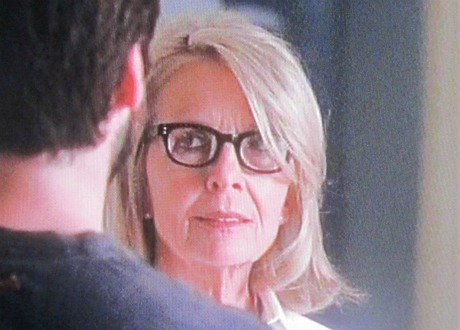In a piece called “The Movie Star,” Grantland‘s Bill Simmons, the sports guy who writes brilliantly about movies every time he steps up to the Hollywood plate, says there are 24 male movie stars right now. The article is basically a two-parter that compares the careers of Ryan Reynolds vs. Will Smith, and how the latter is perhaps the only real movie star around and why Reynolds, for all his likability, good looks and talent, may never get there.
The Big 24, he says, are “Will Smith, Leonardo DiCaprio, Johnny Depp, Tom Cruise, George Clooney, Matt Damon, Brad Pitt, Robert Downey, Christian Bale, Tom Hanks, Denzel Washginton, Ben Stiller, Adam Sandler, Russell Crowe, Jeff Bridges, Steve Carell, Seth Rogen, Will Ferrell, Zach Galifianakis, Mark Wahlberg, Ben Affleck, Jake Gyllenhall (“It kills me to put him on here, but there’s just no way to avoid it,” Simmmons writes), Justin Timberlake (“…who became a movie star simply by being so famous that he brainwashed us”); and, amazingly, Kevin James.
“All of them can open any movie in their wheelhouse that’s half-decent,” says Simmons. “[And] if it’s a well-reviewed movie, even better.
“Look, I like Jeremy Renner, Josh Brolin, James Franco and Jesse Eisenberg. I really like Paul Rudd. None of them are not movie stars…at least not yet. And neither is Ryan Reynolds. But you knew that already.”
The Smith stuff is great.
“Will Smith [has] no interest in stretching himself, just printing money,” Simmons observes. “After his early alien movies, he spent the next 12 years running the Hollywood equivalent of Dean Smith‘s ‘Four Corners’ offense. He made an “action hero who gets framed and has to spend most of the movie sprinting” choice (Enemy of the State), another wacky science-fiction choice (the excruciating Wild Wild West), a sappy period choice (Legend of Bagger Vance, also excruciating), then a calculated ‘I had to get in incredible shape for this biopicc’ choice (Ali, which should have been great but never got there, although I blame Michael Mann more than Smith). That was followed by Men in Black II and everything else above.
“In [a] 2007 Time magazine feature, Smith freely admitted to studying box office patterns much like Theo Epstein studies XFIP and BABIP, saying that he and business partner James Lassiter got together every Monday morning to look at ‘what happened last weekend, and what are the things that happened the last 10, 20, 30 weekends.’ Later in the feature, he unwittingly describes why the movie industry sucks so much:
“‘Movie stars are made with worldwide box office. You put a movie out in the U.S., and let’s say it breaks even. Then the studio needs you to go around the world and get profit. Being able to get $30 mil in England, 37 in Japan, 15 in Germany is what makes the studio support your movies differently than they support other actors’ movies.’
“Again, totally logical…and totally depressing. Will Smith hasn’t taken a chance since 1993’s Six Degrees of Separation — his first major movie, by the way — and only because it doesn’t make sense for him to take chances. He studied a system that spits out a certain outcome, then rigged his career to benefit from that outcome.”
Here’s what I said in my 3.10.11 riff called “Rich Coward”: “What has Will Smith done since the failure of Seven Pounds? Nothing, which is another way of saying he hid for two years and then boldly reemerged last year by committing to Bad Boys and Men in Black sequels. The man is basically George Lucas, talking a diversionary game about wanting to make non-corporate, content-driven movies while doing nothing except going for the safe ‘brand’ money.”





